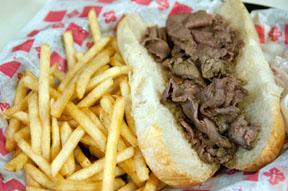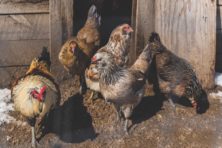Door County Restaurants Turn to Local Beef
- Share
- Tweet
- Pin
- Share
The drawbacks of eating cheeseburgers used to be thought of in simple terms, eat too many and your waistline will swell and arteries will clog. Today there is a new variable in the consumption of greasy goodness.
According to a report from Stockholm University and the Swiss Federal Institute of Technology published in 2000, the production and transportation of every cheeseburger consumed contributes approximately seven pounds of carbon dioxide to the atmosphere.
Fortunately there are several restaurants and farmers in Door County helping people slim down their waistlines and carbon footprint by providing leaner, healthier, locally raised beef.
“We usually purchase about two and a half cows from Steve Kalms,” explains Connie Grotenhuis, owner of the Patio, which has been using locally raised beef in their hamburgers since opening in the 1960s. “There is no question about the quality and freshness. Upon arrival the ground beef is pink all the way through.”
Quality is one of the main reasons more area restaurants use locally raised beef, but its other advantages for the environment and consumer are numerous.
The amount of fuel required to transport beef from farm, to large stockyard to your plate is one of environmentalist’s biggest concerns.
“If your beef travels from a feed lot in Kansas to a butcher in Illinois, it travels a great distance,” explains Jonathan Orrick, owner of Narrow Gates Farms in Sister Bay, which raises 100 percent grass-fed beef. “Then when you consider it was probably born in Montana, it has traveled over 4,000 miles by the time it reaches your plate. Our beef barely travels out of the county.”
The chemicals alone in the corn used to feed the beef in large stock yards are very destructive to the environment.
“These animals are designed to eat grass,” explains Orrick. “The corn changes the pH level in the cows’ stomachs and you have to give them large amounts of antibiotics just to keep them alive, which are in turn stored in the meat you eat.”
While environmental benefits are a large selling point of eating locally raised beef, the flavor is the most important draw.
“Grass-fed beef has more of a gaminess to it,” explains Britton Unkefer, who owns the Wild Tomato restaurant in Fish Creek with his wife, Sara. They purchase all their beef from Narrow Gate Farms. “Regular beef burgers really don’t taste like much, other than fat and whatever seasoning they are doused with. The ground beef we purchase from Jonathan almost tastes like you are eating a steak.”
Apples to apples, locally raised beef is more economical as well.
“You see a lot of places in big cities that advertise using certified organic beef, but you pay twice as much for it,” explains Steve Mueller, owner of the AC Tap, which purchases all of its beef from farmer Bruce Hansen of Ellison Bay. “The beef I use is free-range, organic beef, but I am not going to pay to certify it. I am not going to make my customers pay that much more for it.”
Yet the local beef provides many challenges to the restaurants that use it.
“When you buy local beef, you really have to manipulate the menu,” explains Unkefer. “In each steer there are only two tenderloins which contain about 15 to 18 steaks. You could sell that in one night. You have to be able to utilize different cuts of beef on your menu.”
Locally raised beef can also be a very important asset to the community by providing jobs for local producers and a local specialty for consumers in the restaurants.
“There is no face on the producer when you go to the store and you don’t get to see how the beef was raised,” explains Orrick. “Britton puts our name on the menu at the Wild Tomato and forces many people to ask whether they want a regular cheeseburger or a Door County grass-fed beef burger.”
While there are many nuanced advantages of locally raised beef, the most important is a little more basic.
“The hamburgers are good here,” explains Pat Koessel, resident of Baileys Harbor and long time patron of The Patio. “I wouldn’t be coming here if they weren’t.”




